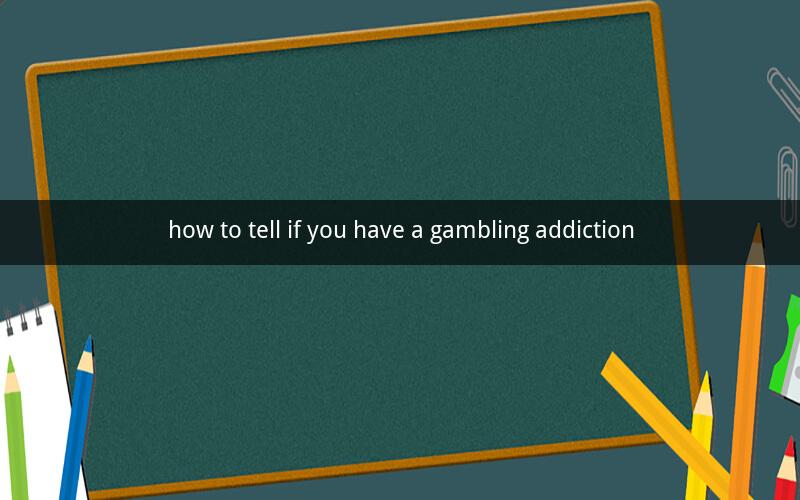
Table of Contents
1. Understanding Gambling Addiction
2. Identifying the Signs of a Gambling Problem
1.1 Financial Issues
1.2 Emotional and Psychological Signs
1.3 Social and Relational Issues
3. Assessing the Severity of Your Gambling Addiction
4. Seeking Help for a Gambling Addiction
1.1 Professional Treatment Options
1.2 Self-help and Support Groups
5. Recovery and Long-term Management
1. Understanding Gambling Addiction
Gambling addiction, also known as compulsive gambling, is a serious condition characterized by an inability to control or stop gambling despite negative consequences. It is a form of impulse control disorder that can affect individuals of all ages, backgrounds, and socioeconomic status. Understanding the nature of gambling addiction is the first step in recognizing and addressing the problem.
2. Identifying the Signs of a Gambling Problem
Several signs and symptoms can indicate a potential gambling addiction. Identifying these signs is crucial in seeking help and taking steps towards recovery.
2.1 Financial Issues
Gambling addiction often leads to significant financial problems. Some common financial signs include:
- Repeatedly borrowing money to fund gambling activities
- Missing payments on bills or loans
- Selling personal belongings to obtain money for gambling
- Stealing or embezzling funds to finance gambling
2.2 Emotional and Psychological Signs
Emotional and psychological signs of a gambling addiction can be more subtle but equally important. These may include:
- Feeling restless or irritable when not gambling
- Experiencing intense feelings of guilt, shame, or remorse after gambling
- Developing mood swings or changes in personality
- Developing depression or anxiety related to gambling
2.3 Social and Relational Issues
Gambling addiction can also have a significant impact on an individual's social and relational life. Some common social and relational signs include:
- Isolating oneself from friends and family
- Lying about gambling activities
- Engaging in secretive behavior regarding gambling
- Neglecting responsibilities at work, school, or home
3. Assessing the Severity of Your Gambling Addiction
Determining the severity of your gambling addiction can help you understand the level of treatment needed. Several assessment tools are available to help you evaluate your gambling habits and the impact they have on your life. Some common assessment tools include:
- The South Oaks Gambling Screen (SOGS)
- The Gamblers Anonymous Problem Gambling Test
- The National Council on Problem Gambling's Problem Gambling Severity Index (PGSI)
4. Seeking Help for a Gambling Addiction
Seeking help for a gambling addiction is a crucial step towards recovery. There are various treatment options available, including:
4.1 Professional Treatment Options
Professional treatment options can provide individuals with the support and tools they need to overcome their gambling addiction. Some common treatment options include:
- Cognitive-behavioral therapy (CBT)
- Dialectical behavior therapy (DBT)
- Medication management
- Residential treatment programs
4.2 Self-help and Support Groups
Self-help and support groups can provide individuals with a sense of community and understanding. Some popular support groups include:
- Gamblers Anonymous (GA)
- SMART Recovery
- Gam-Anon (for family and friends of gamblers)
5. Recovery and Long-term Management
Recovery from a gambling addiction is a long-term process that requires commitment and dedication. Some strategies for long-term management include:
- Developing healthy coping mechanisms
- Setting and maintaining boundaries
- Continuing to participate in support groups
- Seeking ongoing professional treatment
Frequently Asked Questions
1. What is the difference between problem gambling and gambling addiction?
2. Can a person with a gambling addiction recover?
3. How can I tell if my loved one has a gambling addiction?
4. Are there any medications that can help treat gambling addiction?
5. How can I get help for a gambling addiction?
6. Can I recover from a gambling addiction on my own?
7. What should I do if I suspect I have a gambling addiction?
8. How can I support a friend or family member with a gambling addiction?
9. Are there any online resources available for individuals with a gambling addiction?
10. How can I maintain my recovery from a gambling addiction?
Conclusion
Recognizing and addressing a gambling addiction is a challenging but necessary step towards a healthier and more fulfilling life. By understanding the signs of a gambling problem, seeking help, and maintaining long-term management strategies, individuals can overcome their addiction and reclaim their lives.